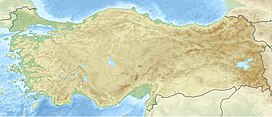Nemrud Dagi
| Mount Nemrut | |
|---|---|
 |
|
| Highest point | |
| Elevation | 2,134 m (7,001 ft) |
| Coordinates | 37°58′54″N 38°44′28″E / 37.98167°N 38.74111°ECoordinates: 37°58′54″N 38°44′28″E / 37.98167°N 38.74111°E |
| Geography | |
|
Adıyaman Province, Turkey
|
|
| Official name | Nemrut Dağ |
| Type | Cultural |
| Criteria | i, iii, iv |
| Designated | 1987 (11th session) |
| Reference no. | 448 |
| UNESCO Region | Europe and North America |
Nemrut or Nemrud (Turkish: Nemrut Dağı ; Armenian: Նեմրութ լեռ) is a 2,134-metre-high (7,001 ft) mountain in southeastern Turkey, notable for the summit where a number of large statues are erected around what is assumed to be a royal tomb from the 1st century BC.
The name is a relatively modern one, dating back to the Middle Ages. In Armenian legend, Hayk defeated the Biblical king Nimrod (equated with Bel) and buried him in these mountains. The conquering Arabs gave many ancient ruins they encountered the name Nimrud, including the famous Assyrian capital.
The mountain lies 40 km (25 mi) north of Kahta, near Adıyaman. In 62 BC, King Antiochus I Theos of Commagene built on the mountain top a tomb-sanctuary flanked by huge statues 8–9-metre-high (26–30 ft) of himself, two lions, two eagles and various Greek, Armenian, and Medes gods, such as Zeus-Aramazd or Oromasdes (associated with Zoroastrian god Ahura Mazda), Hercules-Vahagn, Tyche-Bakht, and Apollo-Mihr-Mithras. These statues were once seated, with names of each god inscribed on them. The heads of the statues have at some stage been removed from their bodies, and they are now scattered throughout the site.
...
Wikipedia

